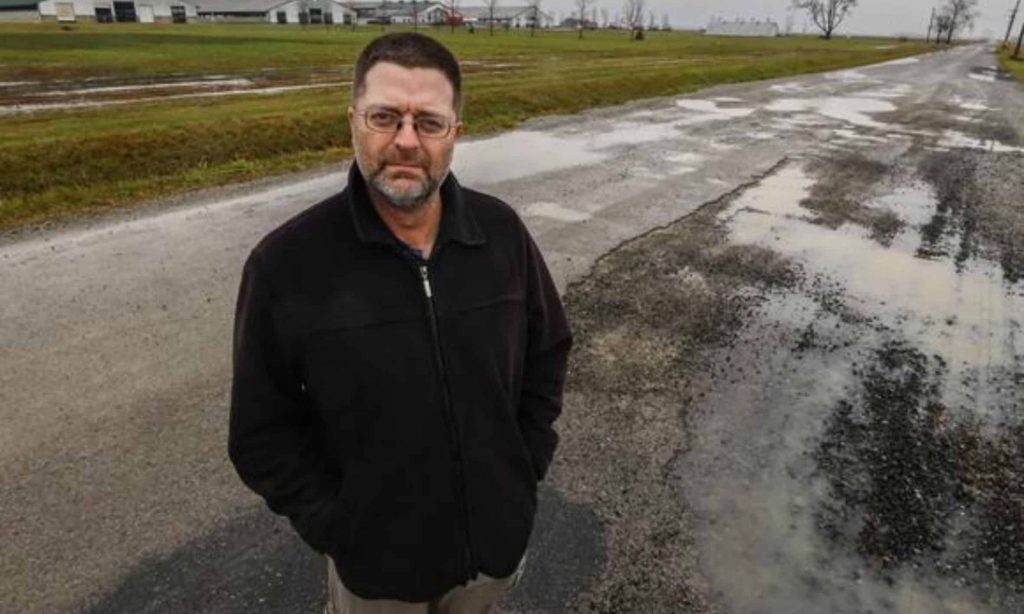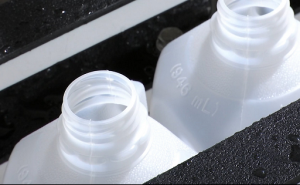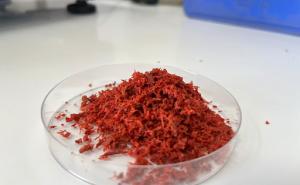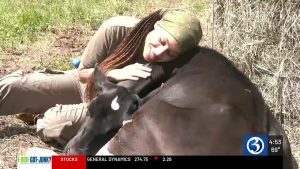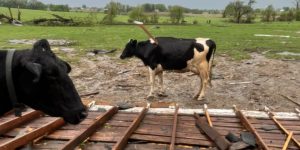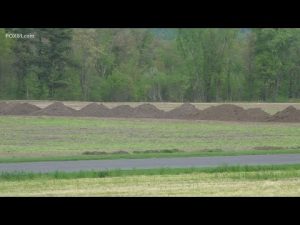
However, traversing the roads — especially around the dairy farms there — can be challenging.
“They have tore the roads up. It’s horrible,” said Tom Harrison, who lives three miles away from Carlyle Farms in Portage Township.
Jason Sisco, chief deputy engineer with the Wood County Engineer’s Office, said there is no doubt that the dairy farm truck traffic has been devastating to the roads.
At the Reyskens Dairy Farm on Cygnet Road, the road was in good shape until silage — cow food made up of corn that is stored throughout the winter — started coming in, truck after truck.
“The roads were obliterated. They were blown up,” Mr. Sisco said. “They were OK at 8 a.m. and when they left they were no longer even passable. … That has happened multiple times.”
Multiple messages were left with Reyskens Dairy Farm, asking for comment. No response was received.
There is no recourse for the road damage, Mr. Sisco said.
“None that we’ve found,” he said. “The dairies would say they’re operating legally on Ohio roads, not overloaded.
“That’s probably true, but it’s the repetitive nature.”
There can be up to 80 acres of silage, with 80 trucks coming in and out of the dairy for six to seven hours in the fall, Mr. Sisco said.
“A township road that doesn’t see semis ever, is going to see 80 trucks? That’s the real issue,” he said. “They were never intended for that amount of traffic.”
An August, 2022 application from Reyskens to expand the dairy farm from 2,000 cows to 3,240 gives a glimpse into how many trucks may travel nearby.
The dairy farm provided a truck count of four milk trucks per day, 12 feed trucks per week, 1,500 loads of silage in the fall, and 300 loads of haylage in the summer.
The Wood County annual budget for road and bridge repairs is $10.5 million. That also includes salaries and fuel, Mr. Sisco said.
Wood County spends $3 million to $4 million on road repairs every year, he said. A road budget for a township may be $200,000 a year, he said.
It costs approximately $700,000 per mile to fix a road, Mr. Sisco said.
According to the Wood County Auditor’s Office, the three dairy farms in southern Wood County pay a total of more than $103,800 a year in taxes. BB Land (Carlyle Farms) pays $59,591, Reyskens pays $29,797 and Continental pays $14,494.
Vickie Askins has spent much of her retirement fighting the dairy farms, since they were built in Wood County in the early 2000s.
“They want to build out where there’s nobody to complain — we don’t have any state reps or state senators that live out there. They build in poor areas, with people that have no power,” Mrs. Askins said. “This is not agriculture, this is agri-business.”
What to do
In February, some dairy farm neighbors met with Mr. Sisco, Wood County Commissioner Doris Herringshaw, and State Rep. Haraz Ghanbari (R., Perrysburg) about the roads. A follow-up letter was sent last month to all the parties.
The hope was that the state would find money to repair the roads. The Ohio Department of Agriculture regulates dairy farms.
Mr. Ghanbari said that the state recently adopted a historic transportation budget, and Wood is one of 88 counties in Ohio.
“It’s just worth reiterating that the legislative process is not as quick as we want it to be,” he said. “There’s not going to be one simple solution to all of this.”
“It doesn’t sound like there’s much traction statewide,” Mr. Sisco said.
Officials have been working with a couple of the dairy farms on solutions, he said.
“They’ve committed to pumping a lot of the manure for applications. Instead of putting it in a truck, they’re pumping it,” Mr. Sisco said, adding that this measure could eliminate 1,400 annual truck trips. “The more of that that can happen from a roadway standpoint, the better.”
Some are also being strategic about truck routing to stay off the more vulnerable roads. Drivers are asked to be careful about staying on the narrow roads and avoiding the shoulder, which breaks the road down, Mr. Sisco said.
He reiterated that the dairy farms are responsible for major damage to Wood County roads.
The damage can often be directly traced back to the farm’s driveway.
“It’s pretty unique to the dairies and related to how they function,” Mr. Sisco said. “Even our largest grain farmers don’t do damage like this.”
Assistance offered
The Wood County Farm Bureau has invited the dairy farm owners to meet. Mr. Sisco said that Will Leone, owner of Carlyle Farms, has attended.
Mr. Leone, who operates a 3,000-herd dairy farm, said he has paid to grind the road, haul stone in, and grade the area.
“We’ve been working with the county engineer to do some things,” Mr. Leone said. “We’re trying to do our best. We comply with all the pertinent regulations.”
The company has certified scales to weigh trucks, which are equipped with iPads that record the weight, he said.
“All the elected officials have been great to work with. We’re trying,” Mr. Leone said. “We prefer to milk cows and keep our heads down and be a good neighbor, and not get into public policy.”
Mr. Ghanbari said he met with Mr. Leone and Mr. Harrison at the dairy farm last month.
“I was impressed with what I saw at the facility, the management and animal care,” he said. “In my opinion, they want to be a good neighbor, and they’re taking strides to do that.”
Amanda Barndt, Wood County Farm Bureau president, said the road issue and how it relates to farms is complicated.
“Understanding this is an issue that stretches well beyond the dairy farm,” she said in a statement. “Wood County Farm Bureau is actively working with government officials at both the township and county levels to look at the use of the roads by agriculture, construction, quarry, pipeline development, transportation, waste management and other industries to find long-term solutions that makes sense to everyone involved.”
Mrs. Askins said the dairy farms need to do more.
“If [my husband] went out there with his tractor and his mower and somehow gouges the road, we have to pay to fix it,” she said, adding that the dairy farms should also be bonded so insurance could apply. “I don’t understand why we have to pay to fix their damage to our roads.”
